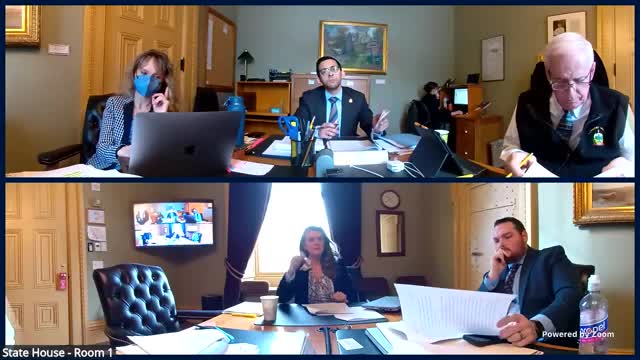Senate Judiciary resumes S.12 markup on sealing, expungement for 18–21-year-olds and municipal violations
Get AI-powered insights, summaries, and transcripts
Subscribe
Summary
Senate Judiciary resumed markup of S.12 on procedural clarifications and substantive changes to sealing and expungement provisions, focusing on records for people who were 18–21 at the time of an offense, municipal/judicial-bureau violations, and aligning earlier motor-vehicle expungement law with the bill.
Senate Judiciary resumed markup of S.12 on procedural clarifications and substantive changes to sealing and expungement provisions, focusing on three areas: records for people who were 18–21 at the time of an offense; how and when municipal or judicial-bureau violations are removed from records; and aligning earlier motor-vehicle expungement law with the bill.
Speaker 1, a committee member, opened the session saying, "Hello? Hi. We're back in senate judiciary. We're gonna resume our conversation about s 12." The committee discussed whether records for individuals who were 18–21 at the time of the offense should be automatically expunged within 30 days of successful completion of sentence, or whether the individual must file a petition with a court to obtain expungement.
The text under consideration says qualifying records for someone aged 18–21 are to be "expunged within 30 days after the date on which the individual successfully completed the terms and conditions of the sentence." Speaker 3 observed that the bill also contains a separate petition process (subsection c), and said the parallel language is confusing: "it kinda sounds almost like it's automatic within 30 days, but I think maybe the intent was that that's the time in which you complete the petition." The committee agreed staff should clarify whether the 30-day language was meant to reflect an automatic sealing or a timeline for a petition to be resolved.
On access to sealed records, Speaker 1 said they prefer sealing over destroying records and proposed limiting access to the defendant and their attorney unless law enforcement makes a formal, justified request through the state's attorney and a judge orders unsealing. "I'm certainly in support moving this to a sealing system ... immediately the only person who has record here has access to it is that 18 to 21 year old defendant, and their attorney," Speaker 1 said. Speaker 3 agreed with restricting routine access and noted narrow exceptions might be considered in rare investigative circumstances (for example, a later-role as witness in a cold case), but said law enforcement should have to justify access to a prosecutor and a judge.
Committee members raised a separate drafting issue about sex-offender/registrable-offense retention: current subsection b(2) refers to BCIC retaining certain records for registrable offenders. Speaker 3 said it reads as if registrable offenses could be qualifying crimes for sealing when the committee's intent is that they are not eligible, and recommended staff ask the defender general's office or the court for clarification.
The committee also reviewed language to expunge municipal and judicial-bureau violations (noncriminal local ordinance or municipal code violations) after two years following satisfaction of judgment. This provision is modeled on a motor-vehicle expungement law enacted in recent years. Speaker 3 described the municipal provision: "2 years following satisfaction of a judgment, per municipal violation, judicial bureau makes an entry and expunged and notifies the municipality." Committee members asked for clarification about the types of municipal violations covered; Speaker 1 and Speaker 3 noted uncertainty about whether certain housing-code or local administrative violations fit the definition.
Members enumerated the motor-vehicle and civil driving-related offenses that were discussed as examples of records already covered by the 2021/2023 motor-vehicle expungement law: operating an unregistered vehicle, failing to possess registration, failing to possess license, operating after suspension, operating without a license, operating without insurance, and operating an uninspected vehicle. Speaker 3 recommended inviting DMV to a future meeting to explain how the motor-vehicle expungement process has worked and how the municipal-violation model should be implemented.
On timing and implementation, Speaker 3 noted the bill's default effective date is July 1 and urged the committee to consider whether courts, prosecutors, and defense counsel would need more time for training and systems changes. The committee agreed staff would prepare a strike-all amendment incorporating the drafting decisions and that the committee would hear from technical witnesses, including a planned appearance by Jeff Wallen, at a future session.
No formal motions or votes were recorded in the transcript excerpt; members paused markup to reconvene with vendor testimony and technical briefings in subsequent meetings. The committee scheduled a later meeting where Senator Kidman is expected to join and where staff will present clarifying amendments and outside testimony.
